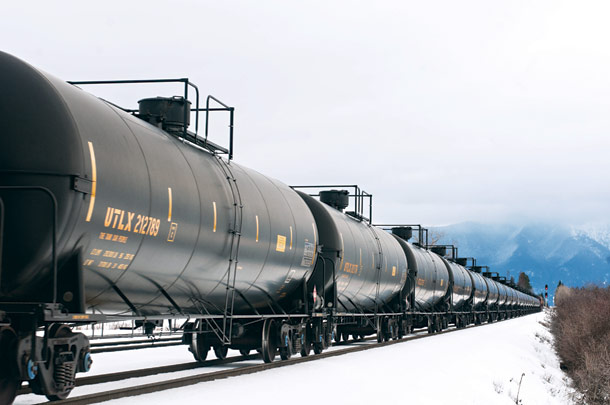While the new highway bill passed earlier this month was primarily aimed at funding the country’s road infrastructure, the Fixing America’s Surface Transportation Act also includes new rules for the movement of crude oil by rail.
Although oil production out of North Dakota has slowed, BNSF Railway is still moving 10 to 18 oil trains a week through Northwest Montana and along Glacier National Park’s southern boundary, according to data released by the state. The movement of oil by rail has come under scrutiny in recent years after a series of explosive derailments, including one in Quebec that killed 47 people in 2013.
Prior to the oil boom, Class 1 railroads, which include the largest rail companies in North America, moved less than 10,000 carloads of crude annually. But starting in 2013, railroads were moving more than 400,000 carloads of crude every year.
The legislation passed by Congress earlier this month reaffirms a timeline established by the U.S. Department of Transportation earlier this year to phase out older and more dangerous rail cars from carrying crude oil. Topping that list is the retirement of all DOT-111 tank cars from crude oil service by 2018. The DOT-111 tank car was the same type that was at the center of the deadly Quebec wreck and is more likely to puncture and release fuel in the event of a wreck. Other types of tank car, like the CPC-1232, will have to cease moving crude by 2025. However, the Secretary of Transportation has the power to extend those deadlines if they feel the industry cannot meet it in a timely manner.
Earlier this year, BNSF took steps to prohibit the use of older DOT-111 and CPC-1232 tank cars on its own rails within three years. Third-party leasing companies, rather than the railroads themselves, own most tank cars.
The new transportation bill also requires that oil tank cars built in the future include a thicker thermal protection blanket that protects the car should it be exposed to fire or extreme heat. New cars will also need to have stronger protective shrouding for the loading and unloading valves.
Another provision in the FAST Act offers funding for community grants that can be awarded to non-profit groups for training and research on how to respond to oil train wrecks. Railroads will also be required to provide more information about the movement of oil trains to first responders and government agencies, including detailed inventories of what each train is transporting.
As the number of crude carloads has increased in recent years, critics have worried about public safety and environmental damage should an oil train derail, especially in an ecologically sensitive place like Glacier National Park.
